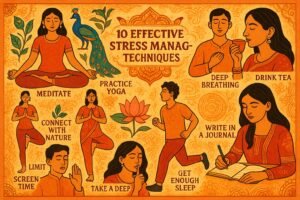
Life often resembles a relentless tornado of responsibilities, deadlines, and unexpected challenges, leaving even the most organized among us feeling overwhelmed and stressed. This constant pressure can impact our physical health, mental wellbeing, and quality of life.
The good news? Effective stress management doesn’t require expensive equipment, special training, or drastic lifestyle changes. Simple, practical techniques can make a significant difference when incorporated into your daily routine.
In this guide, we explore ten science-backed stress management strategies you can implement immediately. From mindful breathing exercises that activate your parasympathetic nervous system to digital detoxing that creates mental space, each technique offers a pathway to greater calm and resilience.
Whether you’re facing work pressures, relationship challenges, or the everyday demands of modern living, these approaches will help you respond to stressors with greater ease and restore balance to your life.
Understanding Stress
Stress is a natural physical and emotional response to challenging situations. While a little stress can be a good motivator, chronic stress can have negative effects on your health and well-being. It’s crucial to understand how stress affects you personally so you can take the necessary steps to manage it effectively.
The Importance of Stress Management
Managing stress is not just about feeling better in the short term; it’s about improving your overall quality of life. Effective stress management can lead to better mental clarity, improved physical health, and a more positive outlook on life. Let’s dive into these stress management techniques that will help you regain control.
Technique 1: Mindful Breathing
Mindful breathing is a simple yet powerful technique. Find a quiet place, sit comfortably, and focus on your breath. Take deep breaths in and out, allowing yourself to focus solely on the rhythm of your breathing. This practice can help calm your mind and reduce anxiety.
Technique 2: Physical Exercise
Engaging in regular physical activity is a fantastic way to combat stress. Exercise releases endorphins, which are natural mood boosters. Whether it’s a brisk walk, a run in the park, or a yoga session, find an activity that you enjoy and make it a regular part of your routine.
Technique 3: Progressive Muscle Relaxation
Progressive muscle relaxation involves tensing and then slowly releasing each muscle group in your body. This technique can help you become more aware of physical tension and promote relaxation. Start from your toes and work your way up to your head, focusing on each muscle group as you go.
Technique 4: Time Management
Effective time management can significantly reduce stress levels. Prioritize tasks by importance and urgency, set realistic deadlines, and make use of planners or digital calendars to keep track of your commitments. Remember, it’s okay to say no to tasks that are not essential.
Technique 5: Journaling
Writing down your thoughts and feelings can be an excellent stress reliever. Journaling allows you to process your emotions and gain perspective on stressful situations. Try to set aside a few minutes each day to write about your experiences and reflect on them.
Technique 6: Social Connections
Maintaining strong social connections is key to managing stress. Reach out to friends and family when you feel overwhelmed. Sharing your feelings and experiences with others can provide support and help you feel less alone in your struggles.
Technique 7: Healthy Eating
Your diet plays a significant role in how you manage stress. Aim to eat a balanced diet rich in fruits, vegetables, lean proteins, and whole grains. Avoid excessive caffeine and sugar, which can exacerbate stress symptoms.
Technique 8: Adequate Sleep
A good night’s sleep is essential for stress management. Aim for 7-9 hours of quality sleep each night. Establish a calming bedtime routine, keep your bedroom environment conducive to sleep, and try to go to bed at the same time every night.
Technique 9: Meditation
Meditation is a powerful tool for reducing stress and improving emotional health. Even a few minutes of meditation each day can help you cultivate a sense of calm and focus. There are many guided meditation apps available that can help you get started.
Technique 10: Professional Help
If you find that stress is becoming unmanageable, seeking professional help may be necessary. Therapists and counselors can provide guidance and support in developing effective stress management strategies tailored to your needs.
Few of the best books for Stress Management:
Conclusion
Stress is an inevitable part of life, but it doesn’t have to control you. By incorporating these stress management techniques into your daily routine, you can lead a happier, healthier, and more balanced life. Remember, it’s important to be patient with yourself and to keep experimenting until you find what works best for you.
FAQs
Q: How quickly can I expect to see results from these stress management techniques?
A: The time it takes to see results can vary from person to person. Consistency is key; with regular practice, you may start to notice changes within a few weeks.
Q: Can stress management techniques replace professional therapy?
A: While these techniques can be effective, they are not a substitute for professional therapy. If you are experiencing severe stress or mental health issues, it’s important to seek help from a qualified professional.
Q: Are there specific exercises that are more effective for stress relief?
A: Any physical activity can be beneficial, but activities like yoga, tai chi, and walking are particularly effective for reducing stress and promoting relaxation.
Start today by trying out one or more of these techniques, and remember that managing stress is a journey. You’ve got this! 🌟



